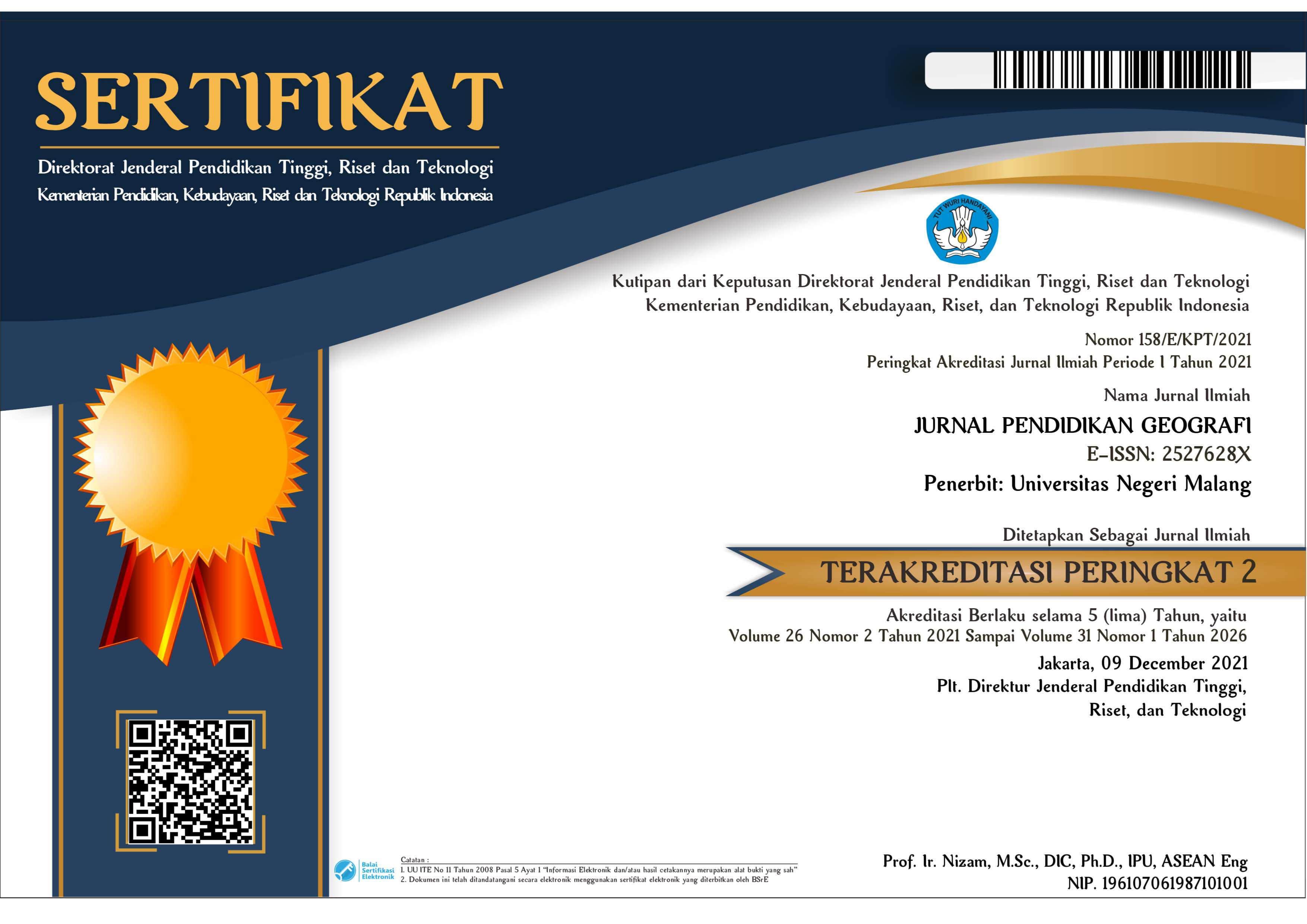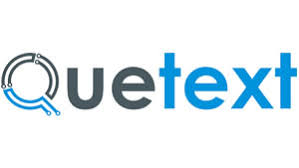Challenges in GIS practice in Geography teacher training during COVID 19 pandemic: Students' perspective from private Islamic university in Indonesia
Abstract
Keywords
Full Text:
PDFReferences
Adnan, M., & Anwar, K. (2020). Online learning amid the COVID-19 pandemic: Students’ perspectives. Journal of Pedagogical Sociology and Psychology, 2(1), 45–51.
Aristovnik, A., Keržič, D., Ravšelj, D., Tomaževič, N., & Umek, L. (2020). Impacts of the COVID-19 pandemic on life of higher education students: A global perspective. Sustainability, 12(20), 8438.
Baber, H. (2020). Determinants of students’ perceived learning outcome and satisfaction in online learning during the pandemic of COVID-19. Journal of Education and E-Learning Research, 7(3), 285–292.
Bradley, R. H., & Putnick, D. L. (2012). Housing quality and access to material and learning resources within the home environment in developing countries. Child Development, 83(1), 76–91.
Bubb, S., & Jones, M. A. (2020). Learning from the COVID-19 home-schooling experience: Listening to pupils, parents/carers and teachers. Improving Schools, 23(3), 209–222.
Chang, C. H. (2020). Teaching and learning Geography in pandemic and post-pandemic realities. J-READING Journal of Reasearch and Didatics in Geography, 2.
Demirci, A. (2011). Using Geographic Information Systems (GIS) at schools without a computer laboratory. Journal of Geography, 110(2), 49–59.
Dewangga, V., Ihsan, P., & Dina, A. (2020). Challenges of conducting distance learning during Covid-19 pandemic: The case of Google Classroom and WhatsApp. PROCEEDING UMSURABAYA.
Di Pietro, G., Biagi, F., Costa, P., Karpiński, Z., & Mazza, J. (2020). The likely impact of COVID-19 on education: Reflections based on the existing literature and recent international datasets (Vol. 30275). Publications Office of the European Union Luxembourg.
Duraku, Z. H., & Hoxha, L. (2020). The impact of COVID-19 on education and on the well-being of teachers, parents, and students: Challenges related to remote (online) learning and opportunities for advancing the quality of education. Retrieved Online from https://www. Researchgate. Net/Publication/341297812.
González, R. D. M. (2021). From international to global understanding: Toward a century of international Geography education. International Research in Geographical and Environmental Education, 30(3), 202–217.
Harpe, S. E. (2015). How to analyze Likert and other rating scale data. Currents in Pharmacy Teaching and Learning, 7(6), 836–850.
Henriksen, D., Creely, E., & Henderson, M. (2020). Folk pedagogies for teacher transitions: Approaches to synchronous online learning in the wake of COVID-19. Journal of Technology and Teacher Education, 28(2), 201–209.
Hoang, A. D. (2020). Pandemic and teacher retention: Empirical evidence from expat teachers in Southeast Asia during COVID-19. International Journal of Sociology and Social Policy, 40(9/10), 1141-1166.
Huber, S. G., & Helm, C. (2020). COVID-19 and schooling: Evaluation, assessment and accountability in times of crises—reacting quickly to explore key issues for policy, practice and research with the school barometer. Educational Assessment, Evaluation and Accountability, 32(2), 237–270.
Kapasia, N., Paul, P., Roy, A., Saha, J., Zaveri, A., Mallick, R., … Chouhan, P. (2020). Impact of lockdown on learning status of undergraduate and postgraduate students during COVID-19 pandemic in West Bengal, India. Children and Youth Services Review, 116, 105194.
Khan, M. A., Nabi, M. K., Khojah, M., & Tahir, M. (2020). Students’ perception towards e-learning during COVID-19 pandemic in India: An empirical study. Sustainability, 13(1), 57.
König, J., Jäger-Biela, D. J., & Glutsch, N. (2020). Adapting to online teaching during COVID-19 school closure: Teacher education and teacher competence effects among early career teachers in Germany. European Journal of Teacher Education, 43(4), 608–622. https://doi.org/10.1080/02619768.2020.1809650
Lloyd, W. J. (2001). Integrating GIS into the undergraduate learning environment. Journal of Geography, 100(5), 158–163.
Mohalik, P. R., & Sahoo, S. (2020). E-readiness and perception of student teachers’ towards online learning in the midst of COVID-19 pandemic.
Mok, K. H., Xiong, W., Ke, G., & Cheung, J. O. W. (2021). Impact of COVID-19 pandemic on international higher education and student mobility: Student perspectives from mainland China and Hong Kong. International Journal of Educational Research, 105, 101718.
Murdaugh, K., Hausknecht, J. B., & Herbst, C. T. (2020). In-person or virtual?–Assessing the impact of COVID-19 on the teaching habits of voice pedagogues. Journal of Voice.
Schultz, R. B., & DeMers, M. N. (2020). Transitioning from emergency remote learning to deep online learning experiences in geography education. Journal of Geography, 119(5), 142–146.
Sit, J. W. H., Chung, J. W. Y., Chow, M. C. M., & Wong, T. K. S. (2005). Experiences of online learning: Students’ perspective. Nurse Education Today, 25(2), 140–147.
Srirahayu, D. P., & Premananto, G. C. (2020). The printed book and electronic book (ebook) experiences of digital natives in Indonesia. Journal of Southwest Jiaotong University, 55(6).
Tang, T., Abuhmaid, A. M., Olaimat, M., Oudat, D. M., Aldhaeebi, M., & Bamanger, E. (2020). Efficiency of flipped classroom with online-based teaching under COVID-19. Interactive Learning Environments, 1–12.
Tetteh, G. A. (2017). The impact of a student’s study time journal as a lesson and learning study. International Journal for Lesson and Learning Studies.
Tsai, C. W. (2013). An effective online teaching method: The combination of collaborative learning with initiation and self-regulation learning with feedback. Behaviour & Information Technology, 32(7), 712–723.
Vojteková, J., Tirpáková, A., Gonda, D., Žoncová, M., & Vojtek, M. (2021). GIS distance learning during the Covid-19 pandemic (students’ perception). Sustainability, 13(8), 4484.
West, B. A. (2003). Student attitudes and the impact of GIS on thinking skills and motivation. Journal of Geography, 102(6), 267–274.
Widodo, A., & Riandi, R. (2013). Dual-mode teacher professional development: Challenges and re-visioning future TPD in Indonesia. Teacher Development, 17(3), 380–392.
Wiegand, P. (2001). Geographical information systems (GIS) in education. International Research in Geographical and Environmental Education, 10(1), 68–71.
World Health Organization. (2021). COVID-19 weekly epidemiological update, edition 56, 7 September 2021. World Health Organization.
DOI: http://dx.doi.org/10.17977/um017v27i22022p126-136
Refbacks
- There are currently no refbacks.
Copyright (c) 2022 Jurnal Pendidikan Geografi: Kajian, Teori, dan Praktek dalam Bidang Pendidikan dan Ilmu Geografi

This work is licensed under a Creative Commons Attribution-ShareAlike 4.0 International License.
Jurnal Pendidikan Geografi: Kajian, Teori, dan Praktek dalam Bidang Pendidikan dan Ilmu Geografi is licensed under Creative Commons Attribution-ShareAlike 4.0 International License,
JPG Indexed By:
View My Stats









12.png)
